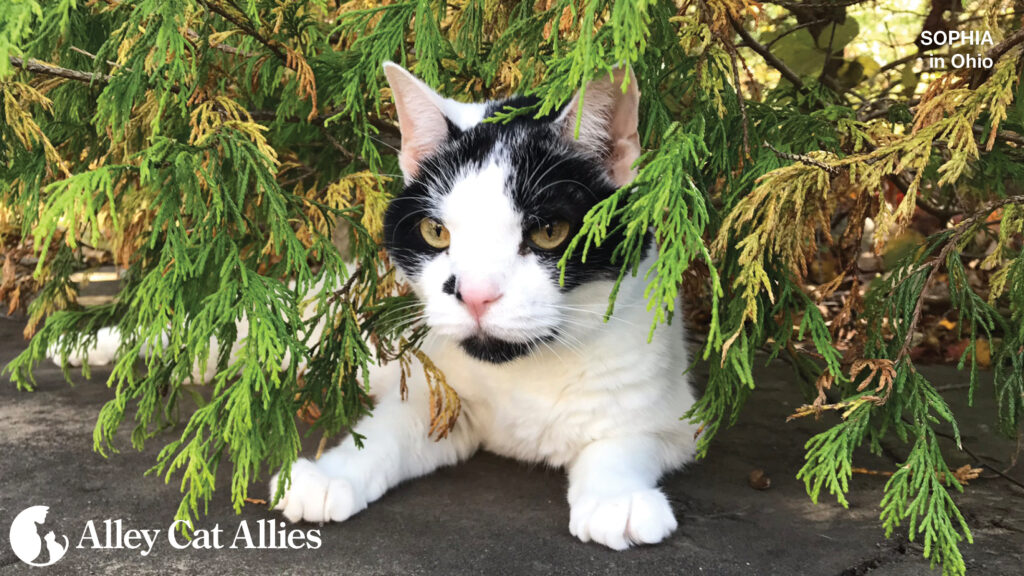Alley Cat Allies sent the following letter to the mayor and village manager of Pleasant Hill, Ohio, urging the Village to embrace and implement a Trap-Neuter-Return (TNR) program for community cats. Additionally, Alley Cat Allies expressed to the Village that feeding bans against community cats are cruel, ineffective, and punish the very people most willing to help cats and their community.
—
Ahead of Pleasant Hill’s meeting on approaches to community cats, or unowned cats who live outdoors, Alley Cat Allies is reaching out to express our support of a Trap-Neuter-Return (TNR) program in the village. We strongly recommend implementing a TNR program, during which the ability to feed community cats on a schedule is critical, and rejecting cat feeding bans that are ineffective and penalize the people most willing to help cats and their community.
Alley Cat Allies is the leader of the global movement to protect cats and kittens. Through our innovative programs and fearless advocacy, we champion the humane treatment of all cats. We work toward a world where every cat is valued and protected and every community and shelter has policies and programs to defend them.
Founded in 1990, Alley Cat Allies launched TNR into the mainstream in the United States, and we regularly work with lawmakers, animal shelters, and the public to change attitudes and advance lifesaving laws and policies that best serve the interests of cats. We offer the opportunity to provide our expertise and resources to Pleasant Hill.
Trap-Neuter-Return (TNR) Is The Only Humane, Effective Approach
The Village of Pleasant Hill should support the only humane and effective approach to community cats that improves cats’ lives and the community—and that is TNR. Through TNR, community cats are humanely trapped; brought to a veterinary clinic to be spayed or neutered, eartipped (the universal sign that a cat has been spayed or neutered through a TNR program), and vaccinated; and then are returned to their original outdoor homes.
TNR is proven to stabilize community cat populations by stopping the cycle of reproduction; improve the cats’ health and public health through vaccinations; and benefit animal control agencies and shelters by reducing cat intake and calls of concern. Today, communities in Ohio and across the country have adopted TNR ordinances or policies, and thousands more worldwide are conducting grassroots, volunteer-led programs.
Recognizing the reality that TNR programs do not always fit squarely within the four corners of existing legal structures, the American Bar Association, the largest association of legal professionals in the United States, took a position in 2017 urging state and local governments to interpret current laws and policies in a way that facilitates TNR. Therefore, it is critical that laws, policies, and interpretations are in place to permit TNR.
Feeding Bans are Ineffective
Feeding bans do not work, punish both the cats and the compassionate people who care for them, and are not supported by science. To cut off food from cats who are used to receiving regular meals is cruel in itself—but does not mean the cats will simply go away. Cats are territorial, bonded to their surroundings, and will not disappear simply because caring individuals can no longer legally feed them. Instead, these cats will roam further to find other food sources that are a byproduct of human habitation and activity. As a result, cats will become more visible in the community, which can lead to increased calls to animal control.
Feeding bans are also very difficult to enforce since they are complaint-driven. They are punitive and tend to direct resources towards administrative tasks like enforcement and away from incentive-based programs that encourage sterilization. Ultimately, ineffective ordinances and policies, like feeding bans, are a waste of taxpayer dollars.
Additionally, feeding bans interfere with TNR because organized feeding is a necessary part of the process. If caregivers are prohibited from feeding, trapping cats is far more difficult, which ultimately leads to fewer spays and neuters taking place. As a result, these laws are counterproductive to Pleasant Hill’s goal of addressing the community cat population.
Please Support TNR
Alley Cat Allies urges Pleasant Hill to embrace a humane and effective approach that improves both cats’ lives and the community—and TNR is that approach.
We are happy to provide any other information that would be helpful and we hope to hear from you soon.


